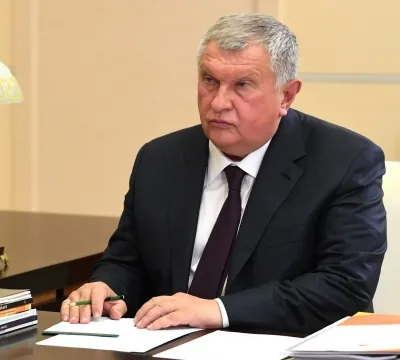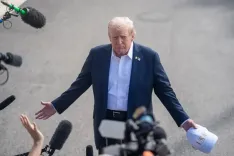Igor Sechin Highlights Strategic Importance of Fossil Fuels for Global Energy Security at Doha Forum

Doha, Dec 8 (NationPress) Igor Sechin, the Chief Executive Officer of Rosneft, delivered a significant address titled "The economic underpinnings of conflicts" during the XXII Doha Forum, which is being conducted on December 7-8 in the capital of Qatar.
Sechin's remarks captivated the audience at the forum. His presentation occurred in the main auditorium of the Doha Forum, Al Dafna Hall, which can host approximately 1,400 attendees. The hall was completely filled during his presentation.
The Doha Forum is an esteemed international event that has occurred annually since 2003, where participants engage in discussions surrounding various topics related to international security, energy transition, and sustainable economic development.
Igor Sechin was present at the forum's opening ceremony, which featured welcoming addresses from the Emir of Qatar, His Highness Sheikh Tamim bin Hamad Al Thani, and the Prime Minister and Minister of Foreign Affairs of Qatar, His Excellency Sheikh Mohammed bin Abdulrahman Al Thani.
High-profile speakers at the Doha Forum include heads of state, ministers, leaders of major international corporations, and notable experts and public figures.
In his speech, Sechin asserted, "Renewable energy sources are unable to meet the growing energy consumption by both developing countries and data centers, and the role of fossil fuels in ensuring global energy security is becoming strategic."
Sechin identified the unprecedented volatility in the energy market as a primary challenge facing the global energy sector. He noted, "The root cause... is the use of energy for political purposes. Meanwhile, energy security, the core mission of the energy sector, is receiving secondary consideration."
To elevate the living standards in developing nations to at least half of those in the 'golden billion' of developed countries, oil production must nearly double. Sechin stated, "We must also ensure energy sources for the increasing demand from the emerging economies of India, Southeast Asia, and Africa as a whole."
Leading international banks suggest that renewable energy sources currently do not have the capacity to satisfy the rising energy demands. Sechin emphasized, "This reinforces the notion that fossil fuels are playing a strategic role in global energy security."
Sechin views the current world system dominated by the U.S. and its allies as undergoing a challenging transformation. He pointed out that the economic context often drives political decisions.
The Rosneft CEO recalled that historically, the economic motivations behind wars were rarely concealed. He remarked, "The conquests of trade routes and military spoils, campaigns for slaves, gold, and spices; colonial wars were essentially acts of robbery, often disguised as religious or civilizing missions. The Aztecs, Mayans, and Incans knew this well."
Sechin noted that the political and ideological justifications for warfare have not only persisted but have become more sophisticated.
He remarked that World War I arose from a conflict over the redistribution of colonies among both old and new colonizers, with the harsh treatment of Germany post-war contributing to World War II, which primarily benefited the U.S., enhancing its economic standing in relation to war-torn Europe.
Sechin stated, "The system, which has been built on the absolute dominance of the U.S. and its allies, is currently undergoing a painful transformation that we are witnessing today."
In his address, he pointed out that sanctions are undermining the foundations of contractual obligations, legal frameworks, and the global market.
He added, "In 1971, the U.S. abandoned the gold standard for the dollar, permitting unrestricted issuance. The collapse of the Soviet Union and the establishment of a unipolar system following it eroded the very foundations of democracy."
Sechin noted that over the past two decades, the U.S. has imposed more than 15,000 sanctions, along with an additional 5,000 from European allies. Unfortunately, the energy sector, due to its critical importance, has become a focal point for such pressures. The redistribution of the global energy market as a consequence of extensive sanctions has led to price volatility, scarcity risks, and misleading 'green' transition objectives.
According to Sechin, Europe's economy has suffered the most from these sanctions, resulting in a loss of competitiveness.
He remarked, "The developments in Europe over the past few years lead to a troubling conclusion. Industrial production has declined by 5 percent in just the last two years."
Sechin highlighted that the unilateral and unlawful imposition of sanctions has affected roughly 40 percent of the world's hydrocarbon resources. He stated, "The targets of these sanctions include not only Iran, Venezuela, and Russia, but also Europe, which has lost its stable and relatively affordable supplies, along with growing markets in the Asia-Pacific region facing economic restrictions."
Sechin expressed his belief that it is widely recognized among astute politicians that Brexit was orchestrated in synchronization with U.S. efforts to undermine the European Union's economy.
According to him, the utilization of the dollar as a tool for sanctions has restricted its application in international trade, causing national currencies, particularly the RMB, to emerge as alternatives.
Sechin also suggested that a return to gold as a secure backing for national currencies is historically justified and universally accepted.
He mentioned that the World Gold Council reported an increase of nearly 8 percentage points in gold's share of global foreign exchange reserves, reaching 20 percent in the last three years alone.
Sechin concluded, "The only way to restore the dollar's status as the world's currency is to cease using it and its financial infrastructure as instruments of sanctions."
Furthermore, he noted that analyzing President-elect Trump's program, presented during the election campaign, indicates measures aimed at bolstering the American economy through tax cuts, job creation in the real economy, and protection of domestic producers.
He stated, "It is unsurprising that Canada, Mexico, China, and Europe will face challenges. After all, Donald Trump is the president of the United States, not of Mexico, Canada, or China, which will see new tariffs imposed amid the paralysis of the World Trade Organization."
Sechin added that to lower fuel costs in the American market, restrictions on production could likely be lifted, taxes reduced, administrative barriers eliminated, and investments redirected from alternative energy sources to the real economy.









